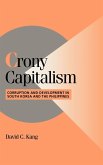Crony Capitalism in the Middle East
Business and Politics from Liberalization to the Arab Spring
Herausgeber: Diwan, Ishac; Atiyas, Izak; Malik, Adeel
Schade – dieser Artikel ist leider ausverkauft. Sobald wir wissen, ob und wann der Artikel wieder verfügbar ist, informieren wir Sie an dieser Stelle.
Crony Capitalism in the Middle East
Business and Politics from Liberalization to the Arab Spring
Herausgeber: Diwan, Ishac; Atiyas, Izak; Malik, Adeel
- Gebundenes Buch
- Merkliste
- Auf die Merkliste
- Bewerten Bewerten
- Teilen
- Produkt teilen
- Produkterinnerung
- Produkterinnerung
This volume provides new perspectives on crony capitalism in the Middle East. It draws on rich empirical information on the activities of political connected firms in the economy and their impact on private sector development in the region.
Andere Kunden interessierten sich auch für
![Ruminations on the Distortion of Oil Prices and Crony Capitalism Ruminations on the Distortion of Oil Prices and Crony Capitalism]() Raymond J LearsyRuminations on the Distortion of Oil Prices and Crony Capitalism27,99 €
Raymond J LearsyRuminations on the Distortion of Oil Prices and Crony Capitalism27,99 €![Ruminations on the Distortion of Oil Prices and Crony Capitalism Ruminations on the Distortion of Oil Prices and Crony Capitalism]() Raymond J. LearsyRuminations on the Distortion of Oil Prices and Crony Capitalism20,99 €
Raymond J. LearsyRuminations on the Distortion of Oil Prices and Crony Capitalism20,99 €![Political Consequences of Crony Capitalism inside Russia Political Consequences of Crony Capitalism inside Russia]() Gulnaz SharafutdinovaPolitical Consequences of Crony Capitalism inside Russia119,99 €
Gulnaz SharafutdinovaPolitical Consequences of Crony Capitalism inside Russia119,99 €![Political Consequences of Crony Capitalism inside Russia Political Consequences of Crony Capitalism inside Russia]() Gulnaz SharafutdinovaPolitical Consequences of Crony Capitalism inside Russia39,99 €
Gulnaz SharafutdinovaPolitical Consequences of Crony Capitalism inside Russia39,99 €![Crony Capitalism Crony Capitalism]() David C. KangCrony Capitalism82,99 €
David C. KangCrony Capitalism82,99 €![The Democratic Politics of Military Interventions The Democratic Politics of Military Interventions]() Wolfgang WagnerThe Democratic Politics of Military Interventions116,99 €
Wolfgang WagnerThe Democratic Politics of Military Interventions116,99 €![Civil Society and Activism in the Middle East Civil Society and Activism in the Middle East]() Nadine SikaCivil Society and Activism in the Middle East116,99 €
Nadine SikaCivil Society and Activism in the Middle East116,99 €-
This volume provides new perspectives on crony capitalism in the Middle East. It draws on rich empirical information on the activities of political connected firms in the economy and their impact on private sector development in the region.
Produktdetails
- Produktdetails
- Verlag: Oxford University Press
- Seitenzahl: 464
- Erscheinungstermin: 23. Juli 2019
- Englisch
- Abmessung: 236mm x 157mm x 36mm
- Gewicht: 907g
- ISBN-13: 9780198799870
- ISBN-10: 019879987X
- Artikelnr.: 56787934
- Herstellerkennzeichnung
- Libri GmbH
- Europaallee 1
- 36244 Bad Hersfeld
- gpsr@libri.de
- Verlag: Oxford University Press
- Seitenzahl: 464
- Erscheinungstermin: 23. Juli 2019
- Englisch
- Abmessung: 236mm x 157mm x 36mm
- Gewicht: 907g
- ISBN-13: 9780198799870
- ISBN-10: 019879987X
- Artikelnr.: 56787934
- Herstellerkennzeichnung
- Libri GmbH
- Europaallee 1
- 36244 Bad Hersfeld
- gpsr@libri.de
Ishac Diwan is currently a Visiting Professor at SIPA - Columbia University. He holds the chair of the Socio-Economy of the Arab World at Paris Sciences et Lettres, a consortium of Parisian universities, and has held teaching positions at Harvard Kennedy School, Dauphine University, and New York University. He worked at the Work Bank for many years in the Research Complex, the Middle East and Africa departments, and the World Bank Institute. His work on international finance and on the Middle East is widely published. Professor Diwan directs the Political Economy program of the Economic Research Forum, an association of Middle East social scientists. Adeel Malik is Globe Fellow in the Economies of Muslim Societies at the Oxford Centre for Islamic Studies and a University Research Lecturer in Development Economics at the University of Oxford. He is also a Research Fellow in Economics at St. Peter's College, Oxford. Malik is trying to develop a broader research lens on political economy of the Middle East. His research articles have been published in Journal of Development Economics, Oxford Economic Papers, World Development, and Modern Asian Studies. His research on Middle Eastern political economy has featured in the CNN, New York Times, Project Syndicate, and Foreign Affairs. Izak Atiyas is an Associate Professor of Economics at Sabanci University, Istanbul, Turkey. He has worked as a senior economist at the World Bank in the Private Sector Development Department and at Bilkent University as visiting Assistant Professor of Economics. He has been with Sabanci University since 1998, and is also the Director of TUSiAD-Sabanci University Competitiveness Forum. His research areas include productivity, industrial policy, policy, political economy, regulation of network industries, and privatization.
* Introduction: Crony Capitalism in the Middle East: What Do We Know
and Why Does it Matter?
* 1: Steffen Hertog: Is There an Arab Variety of Capitalism?
* Part I: Impact of cronyism on growth
* 2: Ishac Diwan, Philip Keefer, and Marc Schiffbauer: Pyramid
Capitalism: Evidence from Egypt
* 3: Izak Atiyas, Ozan Bakis, and Esra Gurakar: Anatolian Tigers and
the Emergence of the Devout Bourgeoisie in the Turkish Manufacturing
Industry
* 4: Ishac Diwan and Jamal Ibrahim Haidar: Clienntelism, Cronyism, and
Job Creation in Lebanon
* 5: Mohamed Said Saadi: Moroccan Cronyism: Facts, Mechanisms and
Impact
* Part II: Mechanisms of privilege
* 6: Leila Baghdadi, Hassan Arouri, and Bob Rijkers: How Do Dictators
Get Rich? State Capture in Ben Ali's Tunisia
* 7: Adeel Malik and Ferdinand Eibl: The Politics of Trade Protection
in North Africa
* 8: Esra Gurakar and Tuba Bircan: Political Connections and Public
Procurement in Turkey
* 9: Steve Monroe: Boundaries of Protectionism: Ethnic Politics and
Crony Capitalism in Jordan
* Part III: Financial markets and cronyism
* 10: Cagatay Birkan and Orkun Saka: Elections and Economic Cycles:
What Can We Learn from the Recent Turkish Experience?
* 11: Mohamed Oubenal: Crony Interlockers and the Centrality of Banks
in Morocco
* 12: Jad Chaaban: I've got the Power: Mapping Connections between
Lebanon's Banking Sector and the Ruling Class.
* 13: Ali Coskun, Serhat Cevikel, and Vedat Akgiray: State and Capital
Markets in the Middle East
* 14: Kevan Harris: Iran's Commanding Heights: Conglomerate Ownership
in the Islamic Republic
* Postface
* 15: Ishac Diwan: The Future of the Private Sector in an Age of
Uncertainty
and Why Does it Matter?
* 1: Steffen Hertog: Is There an Arab Variety of Capitalism?
* Part I: Impact of cronyism on growth
* 2: Ishac Diwan, Philip Keefer, and Marc Schiffbauer: Pyramid
Capitalism: Evidence from Egypt
* 3: Izak Atiyas, Ozan Bakis, and Esra Gurakar: Anatolian Tigers and
the Emergence of the Devout Bourgeoisie in the Turkish Manufacturing
Industry
* 4: Ishac Diwan and Jamal Ibrahim Haidar: Clienntelism, Cronyism, and
Job Creation in Lebanon
* 5: Mohamed Said Saadi: Moroccan Cronyism: Facts, Mechanisms and
Impact
* Part II: Mechanisms of privilege
* 6: Leila Baghdadi, Hassan Arouri, and Bob Rijkers: How Do Dictators
Get Rich? State Capture in Ben Ali's Tunisia
* 7: Adeel Malik and Ferdinand Eibl: The Politics of Trade Protection
in North Africa
* 8: Esra Gurakar and Tuba Bircan: Political Connections and Public
Procurement in Turkey
* 9: Steve Monroe: Boundaries of Protectionism: Ethnic Politics and
Crony Capitalism in Jordan
* Part III: Financial markets and cronyism
* 10: Cagatay Birkan and Orkun Saka: Elections and Economic Cycles:
What Can We Learn from the Recent Turkish Experience?
* 11: Mohamed Oubenal: Crony Interlockers and the Centrality of Banks
in Morocco
* 12: Jad Chaaban: I've got the Power: Mapping Connections between
Lebanon's Banking Sector and the Ruling Class.
* 13: Ali Coskun, Serhat Cevikel, and Vedat Akgiray: State and Capital
Markets in the Middle East
* 14: Kevan Harris: Iran's Commanding Heights: Conglomerate Ownership
in the Islamic Republic
* Postface
* 15: Ishac Diwan: The Future of the Private Sector in an Age of
Uncertainty
* Introduction: Crony Capitalism in the Middle East: What Do We Know
and Why Does it Matter?
* 1: Steffen Hertog: Is There an Arab Variety of Capitalism?
* Part I: Impact of cronyism on growth
* 2: Ishac Diwan, Philip Keefer, and Marc Schiffbauer: Pyramid
Capitalism: Evidence from Egypt
* 3: Izak Atiyas, Ozan Bakis, and Esra Gurakar: Anatolian Tigers and
the Emergence of the Devout Bourgeoisie in the Turkish Manufacturing
Industry
* 4: Ishac Diwan and Jamal Ibrahim Haidar: Clienntelism, Cronyism, and
Job Creation in Lebanon
* 5: Mohamed Said Saadi: Moroccan Cronyism: Facts, Mechanisms and
Impact
* Part II: Mechanisms of privilege
* 6: Leila Baghdadi, Hassan Arouri, and Bob Rijkers: How Do Dictators
Get Rich? State Capture in Ben Ali's Tunisia
* 7: Adeel Malik and Ferdinand Eibl: The Politics of Trade Protection
in North Africa
* 8: Esra Gurakar and Tuba Bircan: Political Connections and Public
Procurement in Turkey
* 9: Steve Monroe: Boundaries of Protectionism: Ethnic Politics and
Crony Capitalism in Jordan
* Part III: Financial markets and cronyism
* 10: Cagatay Birkan and Orkun Saka: Elections and Economic Cycles:
What Can We Learn from the Recent Turkish Experience?
* 11: Mohamed Oubenal: Crony Interlockers and the Centrality of Banks
in Morocco
* 12: Jad Chaaban: I've got the Power: Mapping Connections between
Lebanon's Banking Sector and the Ruling Class.
* 13: Ali Coskun, Serhat Cevikel, and Vedat Akgiray: State and Capital
Markets in the Middle East
* 14: Kevan Harris: Iran's Commanding Heights: Conglomerate Ownership
in the Islamic Republic
* Postface
* 15: Ishac Diwan: The Future of the Private Sector in an Age of
Uncertainty
and Why Does it Matter?
* 1: Steffen Hertog: Is There an Arab Variety of Capitalism?
* Part I: Impact of cronyism on growth
* 2: Ishac Diwan, Philip Keefer, and Marc Schiffbauer: Pyramid
Capitalism: Evidence from Egypt
* 3: Izak Atiyas, Ozan Bakis, and Esra Gurakar: Anatolian Tigers and
the Emergence of the Devout Bourgeoisie in the Turkish Manufacturing
Industry
* 4: Ishac Diwan and Jamal Ibrahim Haidar: Clienntelism, Cronyism, and
Job Creation in Lebanon
* 5: Mohamed Said Saadi: Moroccan Cronyism: Facts, Mechanisms and
Impact
* Part II: Mechanisms of privilege
* 6: Leila Baghdadi, Hassan Arouri, and Bob Rijkers: How Do Dictators
Get Rich? State Capture in Ben Ali's Tunisia
* 7: Adeel Malik and Ferdinand Eibl: The Politics of Trade Protection
in North Africa
* 8: Esra Gurakar and Tuba Bircan: Political Connections and Public
Procurement in Turkey
* 9: Steve Monroe: Boundaries of Protectionism: Ethnic Politics and
Crony Capitalism in Jordan
* Part III: Financial markets and cronyism
* 10: Cagatay Birkan and Orkun Saka: Elections and Economic Cycles:
What Can We Learn from the Recent Turkish Experience?
* 11: Mohamed Oubenal: Crony Interlockers and the Centrality of Banks
in Morocco
* 12: Jad Chaaban: I've got the Power: Mapping Connections between
Lebanon's Banking Sector and the Ruling Class.
* 13: Ali Coskun, Serhat Cevikel, and Vedat Akgiray: State and Capital
Markets in the Middle East
* 14: Kevan Harris: Iran's Commanding Heights: Conglomerate Ownership
in the Islamic Republic
* Postface
* 15: Ishac Diwan: The Future of the Private Sector in an Age of
Uncertainty








